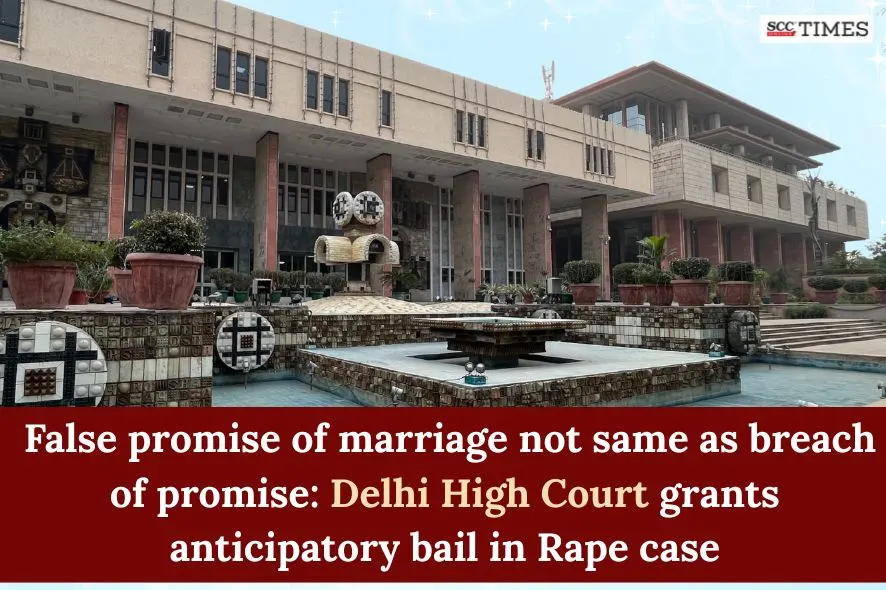Delhi High Court: In an application filed seeking anticipatory bail in FIR filed under Section 376 Penal Code, 1860 (IPC), Ravinder Dudeja, J., granted anticipatory bail and directed that in the event of petitioner’s arrest, he be released on furnishing a personal bond in the sum of Rs. 50,000 with a surety of the like amount to the satisfaction of the Arresting Officer/IO/SHO concerned, subject to certain conditions.
The complaint was lodged by a young woman on 11-09-2025, alleging that the petitioner, her neighbour had sexually exploited her over a two-year period on the false promise of marriage. According to the complainant, the petitioner had proposed to her in August 2023, initiating a romantic relationship that subsequently turned physical. She claimed that the petitioner invited her to his house when his family was away, and relying upon his promise of marriage, she consented to engage in physical relations.
Thereafter, the petitioner allegedly maintained physical relations with the complainant on several occasions, often taking her to hotels. The complainant alleged that every time she insisted upon formalising the marriage, the petitioner evaded her on one pretext or another. Matters escalated when she contacted the police, prompting the petitioner and his parents to persuade her to come to their home with renewed assurances that the marriage would be solemnised in court. She consequently stayed at the petitioner’s residence from 03-08-2025 to 20-08-2025, during which they lived as husband and wife.
On 20-08-2025, the petitioner and the complainant went to Tis Hazari Courts for the supposed court marriage; however, the petitioner allegedly left the court premises on the pretext of fetching his parents and did not return. Subsequent attempts by the complainant to contact him and his family proved futile, prompting her to lodge the present FIR. The petitioner’s anticipatory bail plea before the Sessions Court was rejected on 23-09-2025, leading to the present application.
The Court noted that the material on record, particularly the WhatsApp chats annexed by the petitioner reflected a relationship of mutual affection and voluntary intimacy rather than one induced by deception. The Court found that the messages demonstrated the complainant’s active participation and instances of her threatening self-harm to compel marriage. In particular, communications dated 29-04-2025 and 08-05-2025, in which the complainant explicitly invited the petitioner to engage in sexual intimacy, supported the petitioner’s claim that the relationship was consensual.
The Court also took note of a video recording dated 22-08-2025, wherein the complainant allegedly stated over a phone call with her mother: “Mujhe nahi kami shadi, mujhe to bas ise andar karwana hai,” suggesting an intent to falsely implicate the petitioner.
Upon considering the facts, the Court held that there was no material to suggest that the petitioner had made a false promise to marry from the inception of the relationship, rather, the relationship appeared to be consensual and later turned acrimonious.
The Court then revisited the settled legal principles governing cases of “rape on false promise of marriage.” Placing reliance on Deepak Gulati v. State of Haryana, (2013) 7 SCC 675, the Court reiterated that a distinction must be maintained between a mere breach of promise and a false promise. A false promise is one where the accused never intended to marry from the beginning but deceived the woman to obtain sexual gratification. In contrast, a breach of promise may occur when unforeseen circumstances prevent the fulfilment of a genuine promise. Thus, not every failed relationship can be equated with rape.
Further reliance was placed on Pramod Suryabhan Pawar v. State of Maharashtra, (2019) 9 SCC 608, which clarified that for consent to be vitiated by misconception of fact, the promise of marriage must be false, made in bad faith, and directly causative of the sexual act. The Court also invoked Amol Bhagwan Nehul v. State of Maharashtra, 2025 SCC Online SC 1230, where the Supreme Court cautioned against criminalising consensual relationships that later deteriorate, as such misuse burdens the justice system and irreparably damages reputations.
The Court also cited its earlier ruling in Shane Haider v. State of NCT of Delhi, 2024 SCC OnLine Del 956, which held that determining whether a case involves a false promise or mere breach is a matter for trial, not for custodial interrogation.
Thus, the Court found no justification for custodial interrogation and noted that the petitioner had no criminal antecedents, was not a flight risk, and could be subjected to suitable conditions to ensure his cooperation with the investigation. While acknowledging the gravity of offences under Section 376 IPC, the Court reiterated that criminal law must not be used as a tool of coercion or revenge when a consensual relationship turns sour.
Accordingly, the Court granted anticipatory bail to the petitioner. It directed that in the event of arrest, he be released on furnishing a personal bond of ₹50,000 with one surety of the like amount, subject to conditions that he (a) cooperate with the investigation, (b) share and maintain an active mobile number with the investigating officer, and (c) refrain from contacting the complainant or tampering with evidence.
[Sumit v. State (NCT of Delhi), 2025 SCC OnLine Del 8193, decided on 31-10-2025]
Advocates who appeared in this case:
Mr. Ahmad Ibrahim, Mr. Ishwar Singh Deepak, Mr. Jeet Chakralarti, Ms. Ayesha Zaidi, Advocates for petitioner
Mr. Yudhvir Singh Chauhan, APP. Mr. Anil Kumar, Adv. for the complainant.



